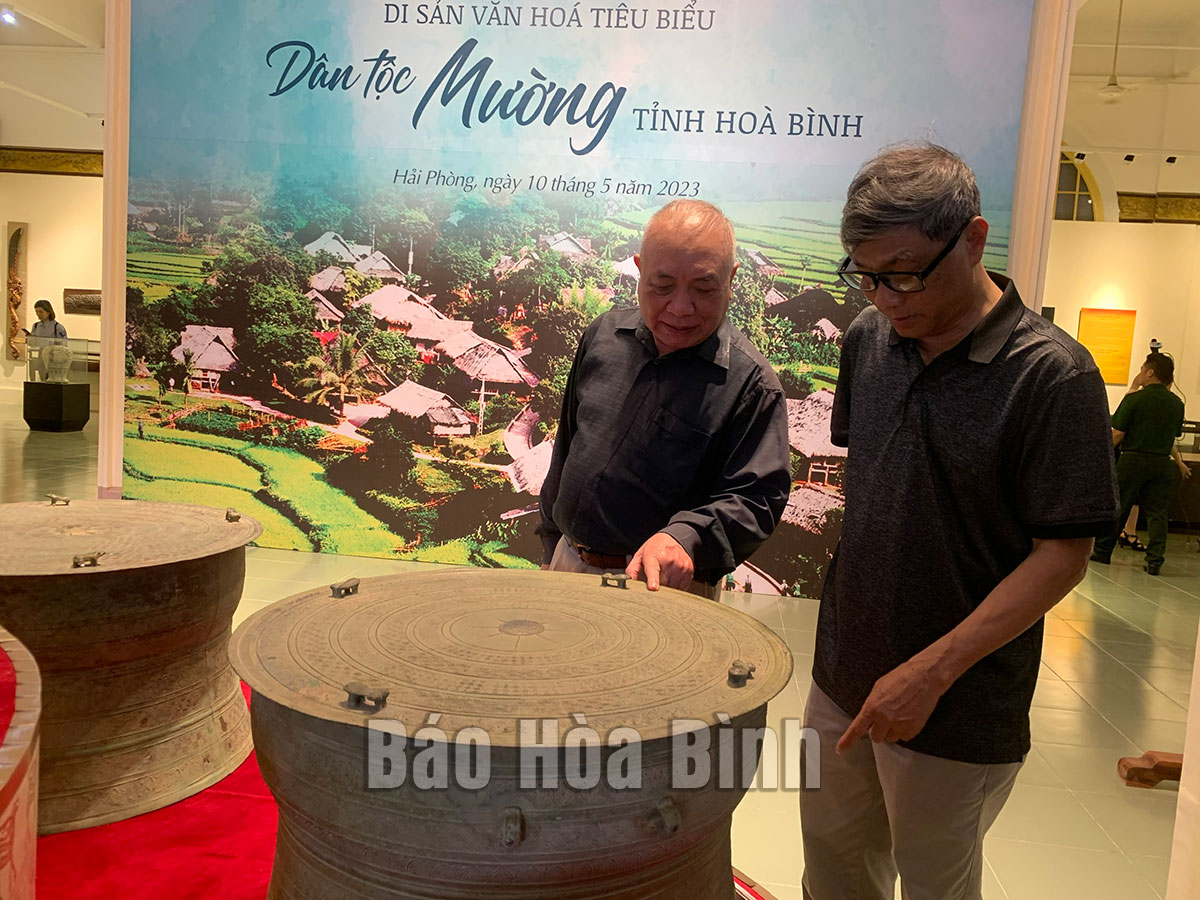
(HBO) – Residents in the northern port city of Hai Phong learnt about cultural heritage and traditional cuisine of the Muong ethnic group in Hoa Binh province through an exhibition held earlier this month at the Hai Phong Museum.
Visitors have a look at a bronze drum displayed at the
Hai Phong Museum.
On display were documents and objects featuring
the Muong group’s cultural heritage. Visitors to the exhibition had a chance to
explore the Muong people’s cultural heritage that has won national recognition
such as the art of playing gongs; Mo Muong - a job and also a performance
practiced at funerals, religious festivals, and life cycle rituals by the Muong
ethnic group; 'Doi' calendar; and Khai ha (going down to the field) festival.
The exhibition also introduced the Muong
people’s spoken and written language, folk literature, social customs,
traditional festivals and performing arts. A range of cultural and art activities
were held on May 10-11.
Nguyen Ba Thanh Long, deputy head of the Hai
Phong antiquities association, said the exhibits present the core of the
national culture, adding that this is the first event that sees the
coordination between the two departments of culture and sports and the Hai
Phong and Hoa Binh Museums.
It helped people understand more about local
culture, while bringing Hoa Binh and Hai Phong closer through culture.
Bui Thi Niem, Director of Hoa Binh's Department
of Culture, Sports and Tourism, highlighted Hoa Binh’s diverse cultural
heritage, which, she said has served as an impulse for the province's
socio-economic development during the cause of reform and integration.
Tran Thi Hoang Mai, Director of Hai Phong city's
Department of Culture and Sports, said the exhibition offered an opportunity to
promote the unique culture of the Muong ethnic group in particular and Vietnam
in general, thus contributing to boosting the tourism sector./.
The clothing of women reflects the culture of the Muong, Thai, Tay, Dao, and Mong ethnic groups in the northern province of Hoa Binh.
Gongs hold a special place in the cultural and spiritual life of the Muong ethnic people in Hoa Binh province. More than musical instruments, they are an indispensable part of community rituals and collective memory, echoing through generations as a spiritual thread linking the past, present, and future.
Preserving and promoting the cultural values of the Muong ethnic group has become an urgent task in the current context, as many traditional values face the risk of fading away. This effort requires not only protecting the cultural identity but also eliminating outdated customs and developing a modern cultural lifestyle, contributing to sustainable values for the Muong community in Hoa Binh province.
The Muong ethnic culture, deeply rooted in Vietnam’s mountainous north, continues to be preserved and revitalised by dedicated individuals and communities determined to safeguard their ancestral identity.
The Muong group is one of the largest ethnic minorities in Vietnam, primarily found in Hoa Binh province. The Muong people in Hoa Binh boast a rich and diverse cultural treasure that reflects the unique identity of this ethnic group. Accounting for over 63% of the province's population, they have created and preserved numerous distinctive cultural values, contributing to their unique identity. Their cultural heritage is an invaluable asset, at the heart of their national identity, and represents a vibrant spiritual life that must be preserved and promoted in today’s modern world.
For generations, the ethnic communities of Hoa Binh province, particularly the Muong people, have preserved vibrant festivals deeply intertwined with the region’s geography, nature, and social traditions. These celebrations enrich Hoa Binh’s spiritual life and cultural identity, reflecting both folk beliefs and the intermingling of ethnic customs. Many of these festivals have endured the test of time, passed down through generations and continuing to thrive today. Among them, the Khai Ha (Going Down to the Field) festival stands out as one of the most significant events of the Muong ethnic group.



